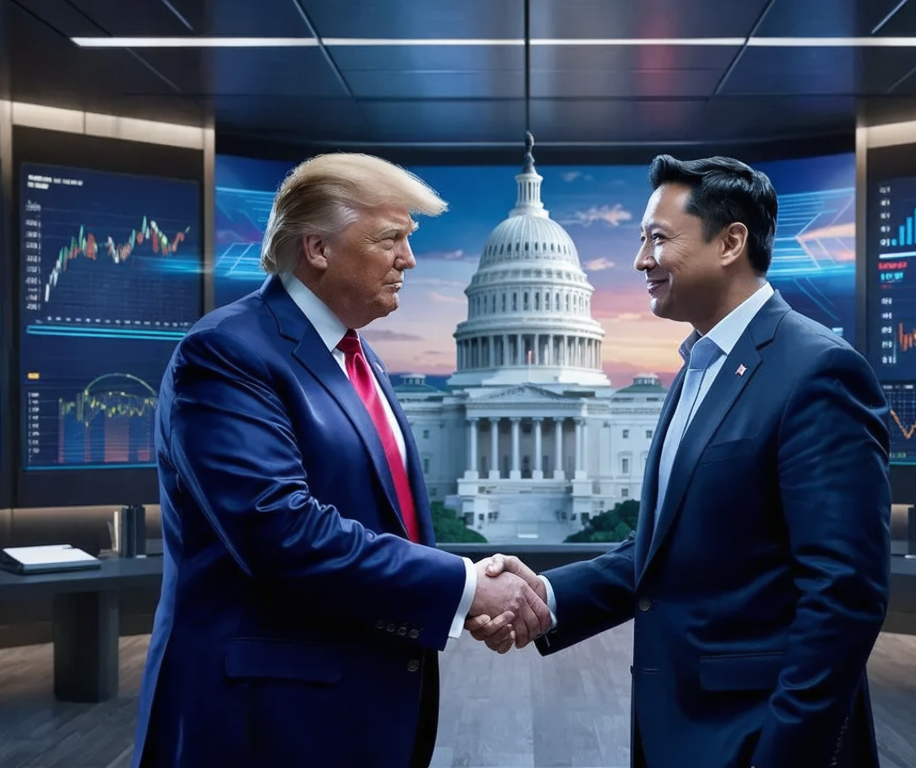rump Appoints Musk and Ramaswamy
In a bold and unconventional move, President-elect Donald Trump has announced plans to establish a new government agency named the Department of Government Efficiency (DOGE) upon taking office in 2025. This department is intended to be headed by prominent billionaire and entrepreneur Elon Musk, alongside former Republican presidential candidate Vivek Ramaswamy. The announcement has sparked considerable discussion and debate across political circles and social media platforms alike, particularly regarding what this means for the future of the U.S. government.

The Vision Behind DOGE
In his recent statement, Trump highlighted the need to overhaul the federal bureaucracy, claiming that a streamlined government would benefit American taxpayers and enhance national efficiency.”These two remarkable Americans will help my Administration break down government bureaucracy, eliminate unnecessary regulations, reduce wasteful spending, and reorganize Federal Agencies,” he declared. This bold vision reflects Trump’s enduring criticism of government inefficiency and overspending.
The specifics of what DOGE will achieve remain somewhat vague, leaving many to speculate about the department’s potential roles and responsibilities. Trump’s announcement emphasizes that DOGE will focus on providing “advice and guidance from outside of Government” and will work in conjunction with the White House and the Office of Management & Budget. Given Musk’s entrepreneurial background and Ramaswamy’s experience in business and policy, their leadership could introduce innovative approaches to governance that have been largely absent in traditional political settings.
Musk’s Ambitious Fiscal Agenda
Elon Musk, the CEO of Tesla and SpaceX, has been a vocal advocate for reducing federal spending. In prior remarks, he has called for cutting approximately $2 trillion from the federal budget. His focus has largely been on eliminating what he perceives as unnecessary expenditures. Notably, Musk has suggested major reductions in funding for specific departments, including the Department of Education and the National Public Radio. With his penchant for disruption and innovation, Musk’s leadership could bring a new perspective on fiscal responsibility.
His previous public engagements during the election campaign, where he generated considerable support for Trump, reinforced his commitment to the former president’s vision for America. Musk’s ability to engage with the public, particularly via social media platforms like X (formerly Twitter), amplifies his influence and provides a direct line to a large audience. His significant financial backing–approximately $200 million funneled into Trump’s political action committee–exemplifies the collusion of wealth and politics that is becoming increasingly prevalent in modern American governance.
Ramaswamy’s Role in the Department
Vivek Ramaswamy, the former Republican presidential candidate and entrepreneur, is no stranger to the complexities of U.S. politics and policy. His background in biotech and finance, along with his advocacy for free-market principles, positions him as a fitting counterpart to Musk in the new department. Ramaswamy has previously emphasized the need for accountability and efficiency in government operations.
As a co-leader of DOGE, Ramaswamy will likely push for policies that align with his campaign platform, focusing on deregulation and reducing governmental intervention in various sectors. His partnership with Musk could signify a shift towards a more business-oriented approach to governance, prioritizing innovation and competitive practices in federal operations.
Speculations and Concerns
While the vision for DOGE appears ambitious, many observers express skepticism about whether such a department can yield the desired efficiency amidst the complicated realities of federal governance. Critics have raised concerns about the impracticality of cutting trillions from the budget and the potential implications of dismantling established government programs. Furthermore, the effectiveness of an “outside” advisory group raises questions about accountability and transparency.
Additionally, the humorous connection between the acronym DOGE and the meme-inspired cryptocurrency dogecoin, which Musk is known to support, adds a layer of absurdity to this announcement. Some critics argue that the decision to name a government department after a cryptocurrency highlights the sometimes informal and unconventional nature of current political dynamics.
Conclusion: A New Chapter in Governance?
As Trump prepares to assume office again in 2025, the establishment of the Department of Government Efficiency under the leadership of Musk and Ramaswamy could mark a new chapter in American governance. If successful, DOGE may reshape how government functions, prioritizing efficiency and cost-effectiveness through a business-minded lens.
However, the path ahead will undoubtedly be fraught with challenges. Balancing fiscal responsibility with the needs of the American public will be a critical task for Musk and Ramaswamy. Ultimately, the question remains: can a government that has often prioritized tradition and stability adapt to the disruptive ethos exemplified by its new leaders? As we await further developments, one thing is clear: the future of DOGE will be worth watching.



